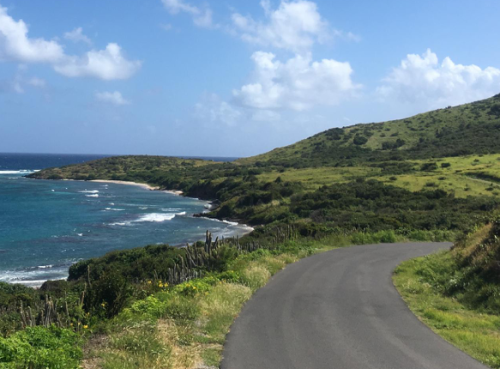
Contact: Noah Barnes, Electrification Coalition
nbarnes@electrificationcoalition.org, (202) 461-2371
CHARLOTTE AMALIE, U.S. VIRGIN ISLANDS—The Electrification Coalition is excited to release the U.S. Virgin Islands Transportation Electrification Roadmap, which can be downloaded at https://electrificationcoalition.org/resource/u-s-virgin-islands-transportation-electrification-roadmap/.
The territory’s size makes it ideal for EVs, and the strong tourism industry also presents an opportunity to add EVs to rental fleets. Electrification is also an opportunity to enhance the USVI’s resiliency to extreme weather events. EVs have dense onboard batteries that can serve as mobile power sources if the electricity supply from the grid is interrupted. In this way, EVs can complement centralized grid operations by serving as a secondary power source for households.
Accelerating the electrification of the territory’s transportation system, including public and private fleets and private vehicles, provides multiple benefits for businesses and residents and will enhance the resilience of the U.S. Virgin Islands. Diversifying transportation fuel to include electricity, even under present-day utility costs, can unlock significant cost savings for residents and businesses, improve vehicle reliability and air quality, and create new workforce opportunities. The aforementioned benefits are furthered bolstered by the territory’s near-term transition to significantly increased utility-scale renewable energy penetration under the Bryan-Roach administration.
The Roadmap was created in partnership with the Electrification Coalition, Bloomberg Associates, and Love City Strong with financial support from the Secunda Family Foundation and Bloomberg Philanthropies. Development of the Roadmap included engagement with local organizations, businesses, government entities, and the USVI Water and Power Authority.
The Roadmap outlines 23 strategies that will advance three overarching goals:
- Cost-effectively transition GVI fleet vehicles in the near term and deploy supportive charging infrastructure.
- Implement policy, regulatory, and programmatic strategies to support widespread EV adoption and equitable access to the benefits of transportation electrification.
- Align transportation electrification activities with enhanced grid resiliency and stable, affordable electricity rates.
The Roadmap assessed the price of electricity and varying gasoline prices across the territory and found that, on average, USVI residents can save significantly on fuel costs by switching to an electric vehicle. Additionally, EVs can save drivers almost 50% over the life of the vehicle in maintenance compared to a gas vehicle. Transitioning USVI’s transportation sector to EVs will reduce the territory’s dependence on imported transportation fuel, thereby strengthening the local economy.
“In 2009, the Virgin Islands Energy Office was mandated by Act 7075 to establish an Energy-Efficient Fleet Management Plan to chart the path for the acquisition of energy-efficient government fleet of vehicles,” said Kyle Fleming, director of the Virgin Islands Energy Office. “After 13 years of unfulfillment, today’s release of the Transportation Electrification Roadmap is further evidence of the Bryan-Roach administration’s ability to creatively leverage progressive policy to align the Virgin Islands with global trends.”
“Transitioning away from oil for transportation brings a variety of benefits, including cleaner air and stable fuel prices,” said Ben Prochazka, executive director of the Electrification Coalition. “We are pleased to work with the U.S. Virgin Islands to help the territory take advantage of these valuable benefits for consumers and businesses.”
“Electric vehicles can save owners money, reduce the territory’s dependence on imported fossil fuels, and provide electricity during power outages,” said Adam Freed, principal at Bloomberg Associates. “The Roadmap lays out a clear pathway to accelerate the adoption of EVs in the USVI and, coupled with an increase in renewables supplying the energy grid, will help establish the territory as a global leader on climate action.”
This Roadmap builds on the territory’s existing electrification, energy, and resiliency efforts. Earlier this year, the territory purchased 23 electric vehicles for its government fleet, and it is working closely with the U.S. Department of Transportation under the Rebuilding America’s Infrastructure with Sustainability and Equity grant program. The total cost of ownership (TCO) savings within the government fleet amount to 20 percent or more when an electric model replaces a light-duty gas vehicle.
###
About the Electrification Coalition: The Electrification Coalition is a nonpartisan, nonprofit organization that promotes policies and actions to facilitate the widespread adoption of plug-in electric vehicles (EVs) on a mass scale to overcome the economic, public health and national security challenges that stem from America’s dependence on oil. ElectrificationCoalition.org
